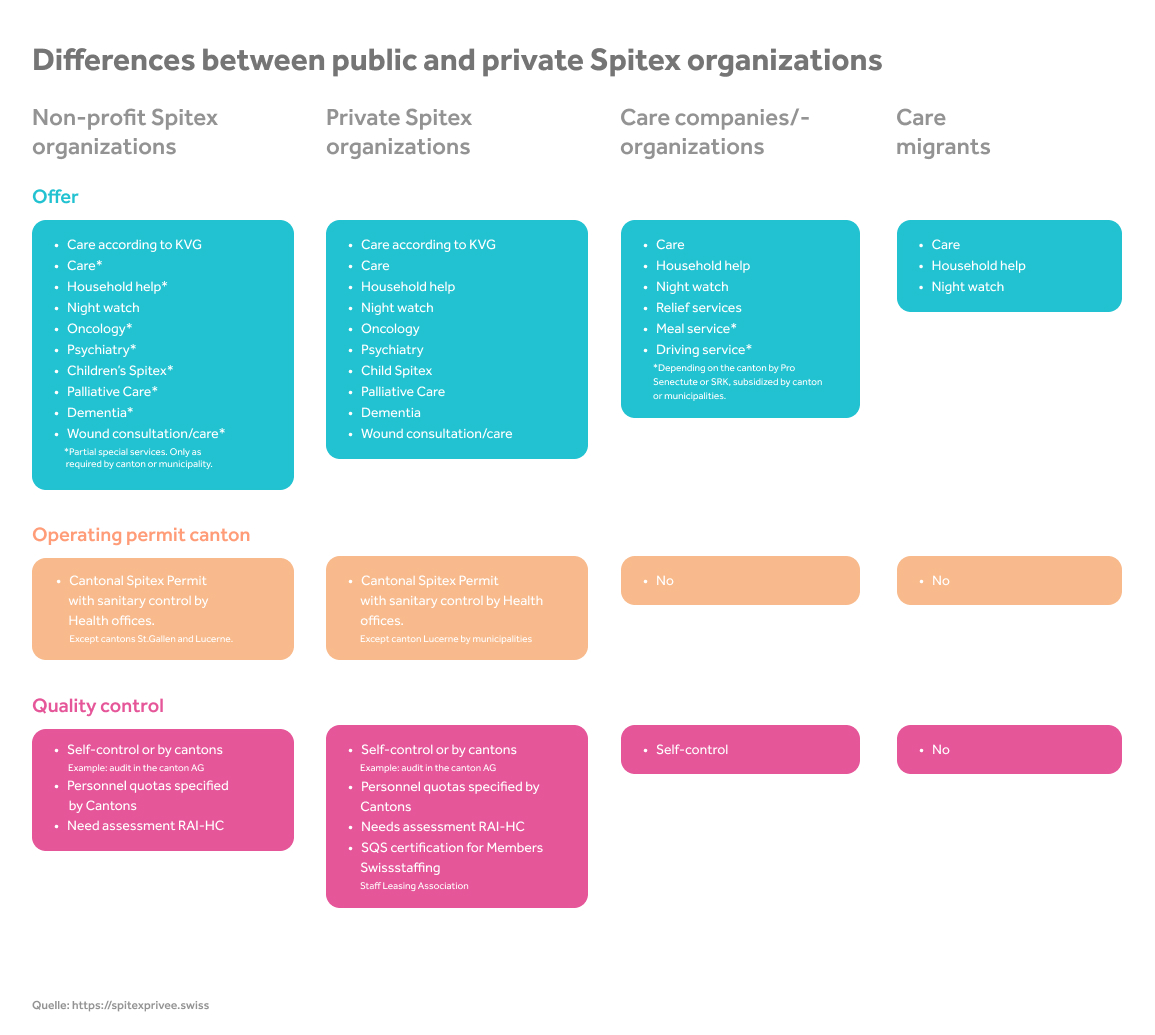Nada Lanz, 43, was born in Albania, grew up in Rome and moved to Switzerland 15 years ago. After going…

Spitex: What private service providers offer
For the care and nursing of people at home, one can commission non-profit or commercial Spitex organisations. quitt. shows the advantages and disadvantages of commercial Spitex service providers compared to non-profit organisations.
That’s what it’s about
- In Switzerland, over 2300 non-profit and profit-oriented Spitex service providers provide nursing and care services at home.
- Private Spitex service providers do not have a state mandate to provide care. They are also allowed to refuse orders.
- In the case of private Spitex service providers, private individuals are the clients.
- Social support or administrative tasks of Spitex service providers are not covered by compulsory health insurance.
- Private service providers usually provide more housekeeping services than non-profit organisations. Private Spitex services have comparatively fewer staff. Their costs can be higher.
Most people only deal with the topic of “external hospital help and care” (Spitex) when relatives or they themselves get into a situation in need of help due to old age, accident or illness. In such cases, the relatives usually take over first. However, time-consuming and demanding care and support tasks require a lot of energy and emotional strength. Caring relatives often reach their limits in the long run.
Spitex organisations: Over 2300 service providers
To ensure that the quality of life of people in need of care and their caring relatives does not suffer, there is now a wide range of service providers in the area of home help and care. In Switzerland, around 2,350 organisations offered Spitex services at the end of 2019. Spitex services in Switzerland are offered by public providers as well as commercial, private companies and self-employed care professionals. It’s good to remember: Often, volunteers from the neighbourhood or a privately employed domestic helper such as a cleaner already provide valuable relief in everyday life.
Spitex: What private service providers offer
According to the Federal Statistical Office, 79 per cent of all Spitex clients are cared for by non-profit Spitex organisations. However, people in need of help are basically free to choose which provider they want to use for basic medical care and other assistance services insured by law through the health insurance scheme. With the amended Federal Health Insurance Act and the Cantonal Long-Term Care Act, the financing of long-term care was reorganised as of 1 January 2011. The Care Act stipulates that recipients of Spitex services must also contribute to the costs of care. The costs for medically prescribed care services at home are to be borne by the health insurance fund, by you and by the municipality. In the case of private Spitex service providers, not all services are subsidised and you may incur additional costs in the area of care and support in the home. At least the rates for compulsory care services are the same for all Spitex providers. Tip: For services that are not subject to compulsory insurance, you should definitely clarify in advance whether and to what extent they are covered by your supplementary insurance. Read more about the differences between care and nursing and the cost implications in the article: «Home care: These are the differences between care and nursing».
How to find private Spitex service providers in your area
A selection of private Spitex service providers can be found on the website of the Association Spitex privée Suisse ASPS (German/French/Italian). According to the association, the objectives of private Spitex organisations are “the same as those of public organisations: Individual help, care and support at home in order to avoid or shorten hospital or home stays.” Private Spitex organisations are organised as associations, foundations, limited liability companies or public limited companies.
Private Spitex: Private individuals are the clients
The clients of private Spitex organisations are always the clients themselves or their relatives and not the municipalities. Those who deliberately want a private organisation with a broader range of services must contact a private organisation themselves. The range of services offered by private Spitex providers includes not only the actual medical care, but also domestic services, night services and coaching for relatives. Social support and entertainment for people are also part of the scope of services. Specialised care for people with special medical conditions such as dementia or paraplegia are also included.
Private service providers are smaller and more flexible
According to the Federal Statistical Office, non-profit Spitex organisations have an average of 33 full-time positions. The for-profit companies have nine full-time positions and the self-employed care professionals 0.6 positions. This means that almost 80 per cent of employees and clients are accounted for by non-profit enterprises, although the latter only account for a quarter of all service providers.

The same quality criteria, but fewer subsidies
Private Spitex organisations basically provide the same counselling and care services as public organisations – provided they have a cantonal operating licence and a ZSR (paying agency register number) from the health insurance fund. Private providers also work according to the same quality criteria as the public organisations and bill the same payers, such as health insurance companies, accident, military and disability insurance companies.
Private Spitex don’t have always a training mandate
According to the ASPS, commercial Spitex organisations employ qualified nursing and psychiatric staff as well as staff who have completed the Swiss Red Cross (SRC) basic course and those returning to work. In private Spitex organisations, the rates are fixed and are only partially subsidised by the public sector. In contrast to private providers, public Spitex has a training mandate. They have to train the next generation of nurses for the health system. In many places, private Spitex organisations do not have to make this effort.
Private service providers can refuse orders
Commercial providers do not have a public care mandate and thus do not have the duty to ensure that every Swiss citizen receives the basic care services they need, regardless of their place of residence, age or social class. In terms of working conditions and wages, public Spitex organisations are guided by public sector personnel law. Private Spitex organisations, on the other hand, do not have to adhere to these framework conditions. Finally, from the point of view of the relatives and the people being cared for, it is important to clarify: Is the caregiver qualified for his or her work and does the person do a good job?
Private service providers have a broader offer
The public Spitex companies are limited in terms of the services they can provide, as they are designed to provide only the “effective need”, which is precisely calculated. Especially in the area of night-time services, private companies have a much more comprehensive offer. There are other alternatives.
The option: Hire care staff or domestic help yourself
Private arrangements with domestic or foreign carers or domestic helpers are comparatively cheap for private individuals. The reason: In Switzerland, private care work at home is not subject to the Labour Code. Anyone who wants to hire a caregiver or domestic help at home can arrange the terms of the contract relatively freely. However, an employer must take out compulsory insurance for his domestic help, prepare payslips and salary statements and pay social security contributions.
quitt. takes care of all the paperwork for you
With quitt. your private care and household help is guaranteed to be correctly employed and insured. The quitt. team will take care of the AHV registration, payroll accounting and insurance of your auxiliary staff for you. We also support you with all labour law issues relating to care at home. In short: we take care of all the paperwork for you.





